












 Dr Rejaul Karim Barbhuiya Assistant Professor, Central Institute of Educational Technology (CIET), NCERT, Ministry of Education, Government of India
Dr Rejaul Karim Barbhuiya Assistant Professor, Central Institute of Educational Technology (CIET), NCERT, Ministry of Education, Government of India

Times have changed. Today is not the time of memorising and copying. Students must be enabled to think for themselves and articulate their thoughts well. They should be able to participate meaningfully and confidently in day-to-day activities – whether it be buying groceries, registering a formal complaint, or voicing opinions freely. A problem-solving attitude, critical outlook, scientific temperament and creativity are non-negotiable skills in the 21st century.
The National Education Policy 2020 talks about technology playing an important role in improving the learning outcomes and learning experiences of children. With the growing penetration of the internet and the easy availability of smartphones and other electronic devices, both parents and teachers can participate in and supervise children's learning through various online apps, quizzes, videos, e-books, educational games and so on. In a nutshell, digital learning has the potential to impact on what children learn and how they learn.
Aakash Chowkase
In the post-Covid world, more than ever before, the parents' role is being seen as pivotal to children's growth and learning. The National Education Policy 2020 released by the Government of India, recognises parents as equal partners in their children's education. At home, it is important for caregivers to create a safe, engaging and positive environment for children to learn, apply themselves and have fun. Parents can also engage actively with children around their homework, curricular and co-curricular activities and projects.
NEP 2020 acknowledges the multilingual reality of India and asserts that the bridge of home language or other familiar language is absolutely crucial for children in the foundational years, not only to help them to comprehend basic subjects, but also to acquire additional languages like English. Thus, the needs-based and systematic use of learners' home languages should be encouraged in the classrooms, along with an anxiety-free, purpose-oriented and input-rich environment.
Aparna Dixit Head of Content and Research, Centre for Learning Resources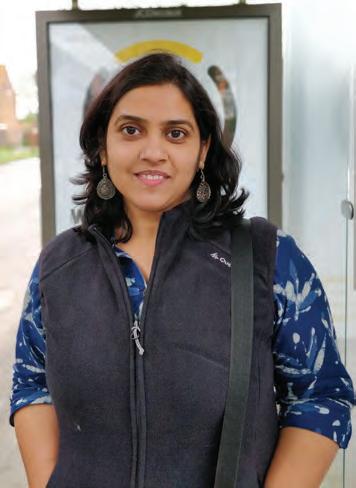
 Ms Sonia Kumari Assistant Professor, Kamala Nehru College, University of Delhi
Dr
Post-doctoral Research Fellow, University of California, Berkeley, USA, Department of Psychology
Ms Sonia Kumari Assistant Professor, Kamala Nehru College, University of Delhi
Dr
Post-doctoral Research Fellow, University of California, Berkeley, USA, Department of Psychology
Thanks to globalization and the emergence of technologies, international boundaries have become blurred. English, to a high degree, is a commonly understood medium of communication. It is one of the key tools that students need to perform well today and in the future. According to a global study, while recruiting, 98.5% of employers implicitly or explicitly assess a candidate’s English communication skills! There is therefore a growing demand for English communication skills, because it empowers people and enables them to lead a better life.
Functional communication skills, involving aspects of LSRW (listening, speaking, reading and writing), are central to knowledge acquisition, children’s intellectual, social and emotional growth, and life-long learning. Specifically, strong listening and speaking skills are not only vital in the overall language learning process, but also lead to better reading and writing skills. Yet, these foundational skills tend to be neglected in schools due to the high pupil-teacher ratio, lack of oral language-focused assessment, and most importantly, a lack of systematic and allocated practice time for these skills within the classroom.
Aligned with NEP 2020, NCERT learning outcomes and standardized to CEFR (Common European Framework for Reference) levels, Uolo Speak is a hybrid learning program that focuses on building, applying, practising, and assessing these core language skills.
First, through this book as one of the components of the program, the English classroom becomes an avenue to hone functional speaking skills in real time. The teacher-led activities give learners the opportunity to undertake high-quality, level-appropriate, and experiential activities that help to build confidence and expression in English.
Second, the mobile interface of the product ensures consistent practice of functional LSRW skills. These exercises go beyond traditional question types and employ cutting-edge technology to enable learning and generate instant feedback. For instance, learners practise speaking with Al (artificial intelligence), as if conversing with a real person!
Third, Uolo Speak assessment can be conducted by the school in sync with their academic calendars. The assessment is evaluated by Uolo’s English specialists to give performance report and feedback.
Finally, the reporting methodology used in the above three program components, generates a skill growth chart against CEFR levels for each learner, class and the school. Educators can then clearly identify learners who are reaching, meeting, and exceeding the level requirements, and support them accordingly.
Uolo Speak is a powerful, exciting, and unique experience for learners and teachers. It represents a real life and results-oriented approach to develop essential 21st century functional English skills.
Wishing all teachers, parents, and learners lots of fun and joyful experiences as you embark upon this exciting journey with Uolo Speak.
Dr Laraine O'Connell
D. Litt., English, North West University, South Africa
I am a veteran English teacher and lecturer, with a great love for English and for teaching. I have taught English and trained teachers over many years. I live in South Africa and it is a wonderful experience working with a company promoting the learning of English in India.

Part





Chapter number and name



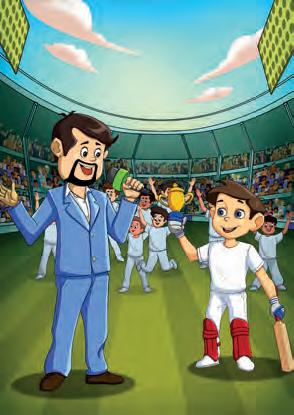
Keywords
Work alone


Work in pairs






Work in groups





Teacher does the activity with learners




Writing notes


1 What Do You Think? Feelings and point of view
2 Participating in Conversations Engaging in conversations
Understand a person's feelings and point of view
Share personal feelings and point of view
Gather details from others' conversations
Participate actively in conversations
Identify the main idea of a formal complaint/request
3 Formal Requests Formal conversations
4 Sum It Up Giving a summary
5
Let’s Craft Stories Storytelling
6 Sharing Experiences
Recounting a personal experience
Articulate thoughts in a formal grievance/requestrelated conversation
Identify key details

Present a crisp and clear summary
Identify key events and the main idea of a story
Tell stories to an audience in an engaging manner
Retell important details after listening to someone's experience
Describe a personal experience in some detail 7
What’s Your Opinion? Presenting a point of view on a topic
Infer someone's point of view on a topic
Express a point of view on a topic with a reason 8 Do You Agree? Agreeing or disagreeing
Critically evaluate different points of view on a topic
Agree or disagree with a point of view 9 Twisting the Story Completing a story
Change parts of a story
Present the story to an audience
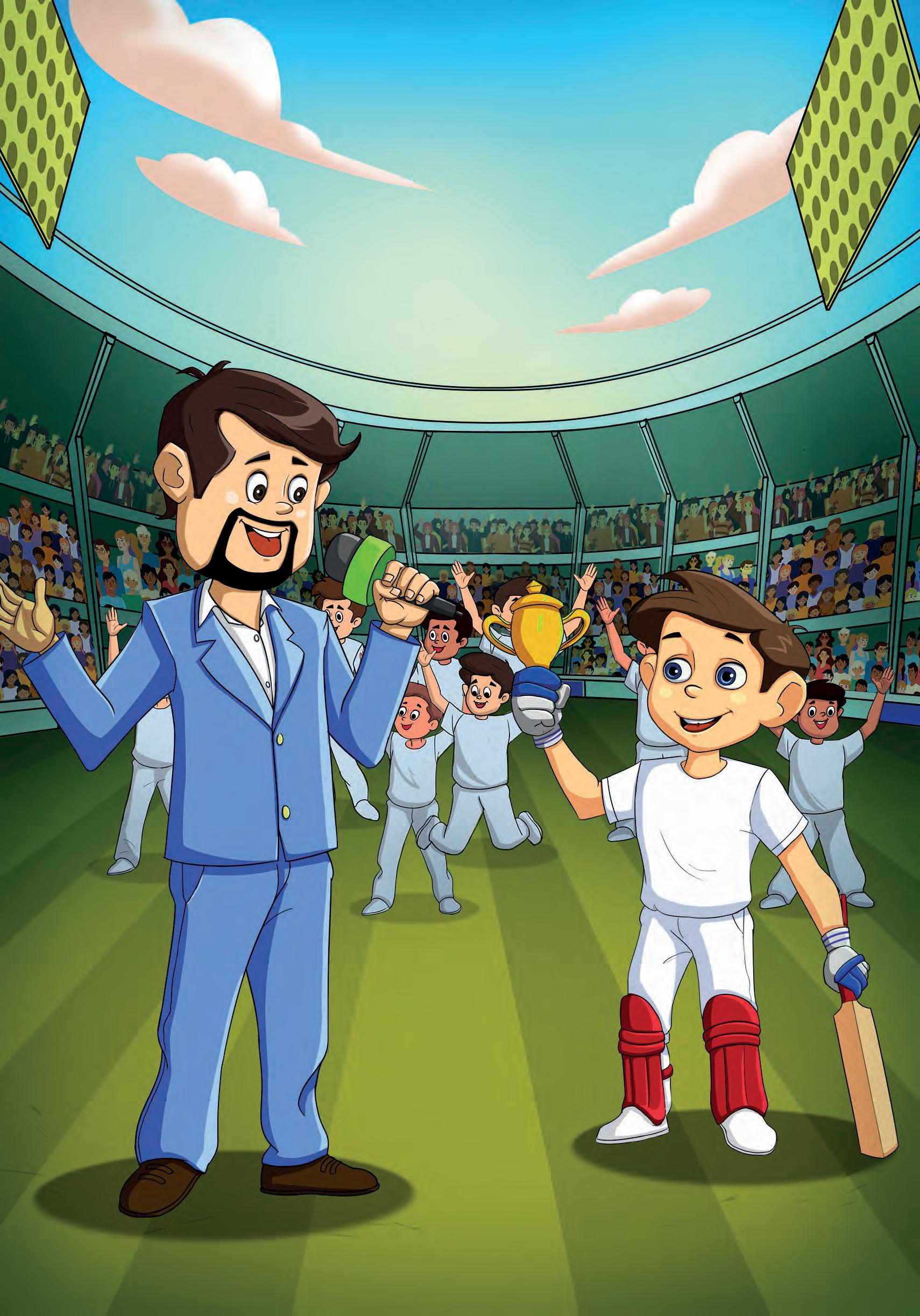
Known for:

• Royal Bengal tigers, elephants and birds
• Adventure sports like river rafting
• Wildlife jeep safari and camping
I went to Jim Corbett National Park with my family in December. Do you know it’s one of the oldest National Parks in India?
We went by road in our car, and it took us 6–7 hours to get there. In my opinion, the best part of going on a long trip in your personal car is all the fun moments you get to share with your friends and family. The first night, we all were tired, so we had a delicious meal and went to bed. The next morning, all the excitement began when I got to know we were going on the famous wildlife jeep safari.
Can you imagine the beautiful view, surrounded by hills, lakes, and waterfalls? It was awesome!
We saw a Royal Bengal tiger and a herd of elephants during the safari. The tiger walked majestically just a few feet away from our jeep. It was a little bit scary, to be honest, and yet so exciting!
Evening safaris, in my opinion, are better in the winter because you can see more animals than in the morning. Though it is not proven, this is what I have observed.
 Jim Corbett National Park (Nainital, Uttarakhand, India)
Jim Corbett National Park (Nainital, Uttarakhand, India)
The next day, we went camping in the wild and stayed in a tent. This was the first time that I heard the park come alive with the sounds of birds chirping. I also saw the beautiful rain quail and the Himalayan bulbul through binoculars.

It was such a thrilling and fun-filled trip! Being out in nature and seeing the wild animals up close is an experience that I will never forget. Not to forget the delicious food! Arsa, a yummy sweet dish from the Nainital region, is a must-have!

I highly recommend the wildlife jeep safari that the park offers. It’s such a unique experience. I promise you won’t be disappointed! So, what are you waiting for! Just drive down by car or take a bus or train to reach this lovely spot. I feel that everyone should definitely go on this amazing adventure at least once in their life!
majestically (muh·jeh·stuhk·lee): in a beautiful and a powerful way opinion (oh·pi·nee·uhn): what you think about somebody or something recommend (reh·kuh·mend): to advise someone to do or get something unique (yoo·neek): only one of its kind





Look at the images given below. What do you think about tigers living in zoos and in the wild? Say ONE sentence about each situation.


taken care of sad safe
protected from hunters
caged against their will
trapped hunters proper food on their own dangerous
free run happy stronger natural habitat
roam freely
You can start as follows: In my opinion… I think… I feel…














Listen to Kiran’s experience at an art exhibition. Then, record it.






Think of a new dish you recently tried. Did you like it? Tell us why or why not.







Tick (ü) the statements you agree with. Cross (×) the statements you do NOT agree with.
1. Travelling to different places is a waste of time and money.

2. Cocurricular activities are as important as subjects like science, language and mathematics.
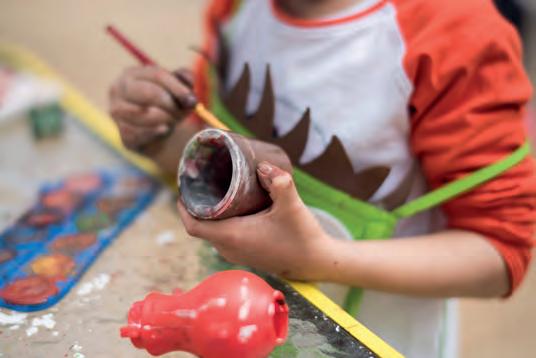


3. Jogging is the best way to remain fit.

4. Learning to drive a vehicle is important for everyone.

Write your point of view on any ONE of the given statements. Then, practise and tell your classmates about it.

1Look at the given statements. Tick (ü) any ONE that you would like to speak about.

We should make our cities car-free.
We should adopt street dogs.
Say NO to one-time use plastic containers.
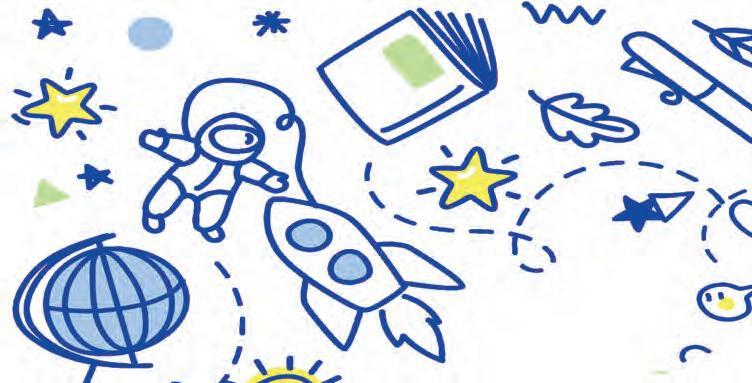
Everyone should learn to cook.

Write: Now, write what you think about the topic you have chosen.

(say a greeting)
(write the topic you selected)
(agree/disagree)
I have selected the topic- . I with it. .
(tell what you think and what we should do)


Thank you.
Speak in complete sentences. Use actions and expression when you speak. Look at your friends when you talk. You can read from the book if you want to.

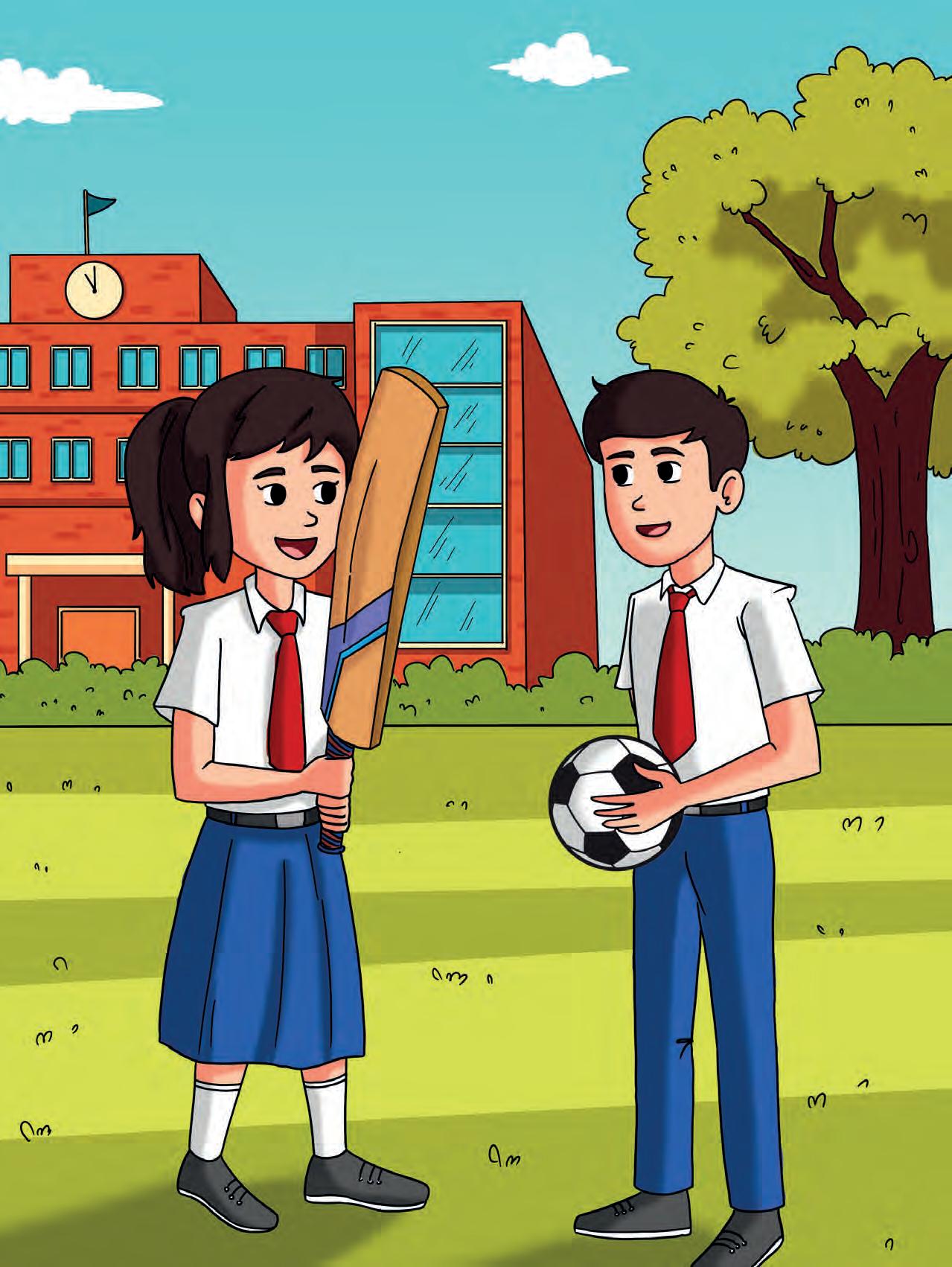
Outside the viva room, students are waiting…
Hey Yash! How did the viva exam go? It went really well!

That’s great! What did Ma’am ask?
She first asked what is the largest…
Next student, please come in!
Oh no! It is almost my turn. Can you please skip the questions and tell me the answers only?
Okay. Answer 1 - Pacific Ocean; Answer 2 - Kabaddi; Answer 3Venus
Pacific… Kabaddi… Venus

I’ll ask some different questions now.
Next student, please come in!
Inside the Viva room…Hello Sanju. Are you ready?
Yes, Ma’am.
Which sport is MS Dhoni famous for?
Tell me, what is the longest river in India?
Pacific Ocean.
What is the capital of India?
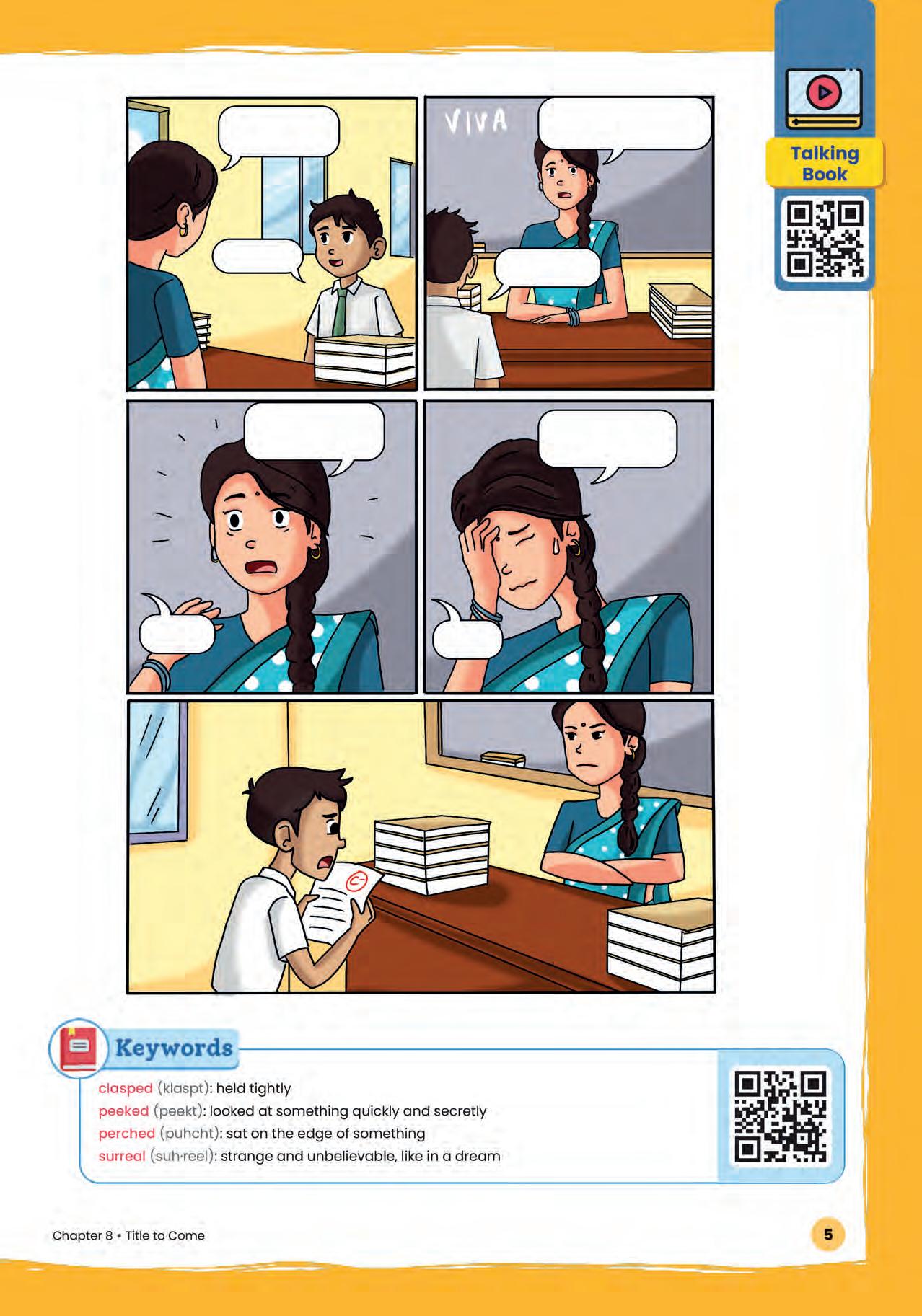
 Kabaddi!
Venus!
Kabaddi!
Venus!
What happened?
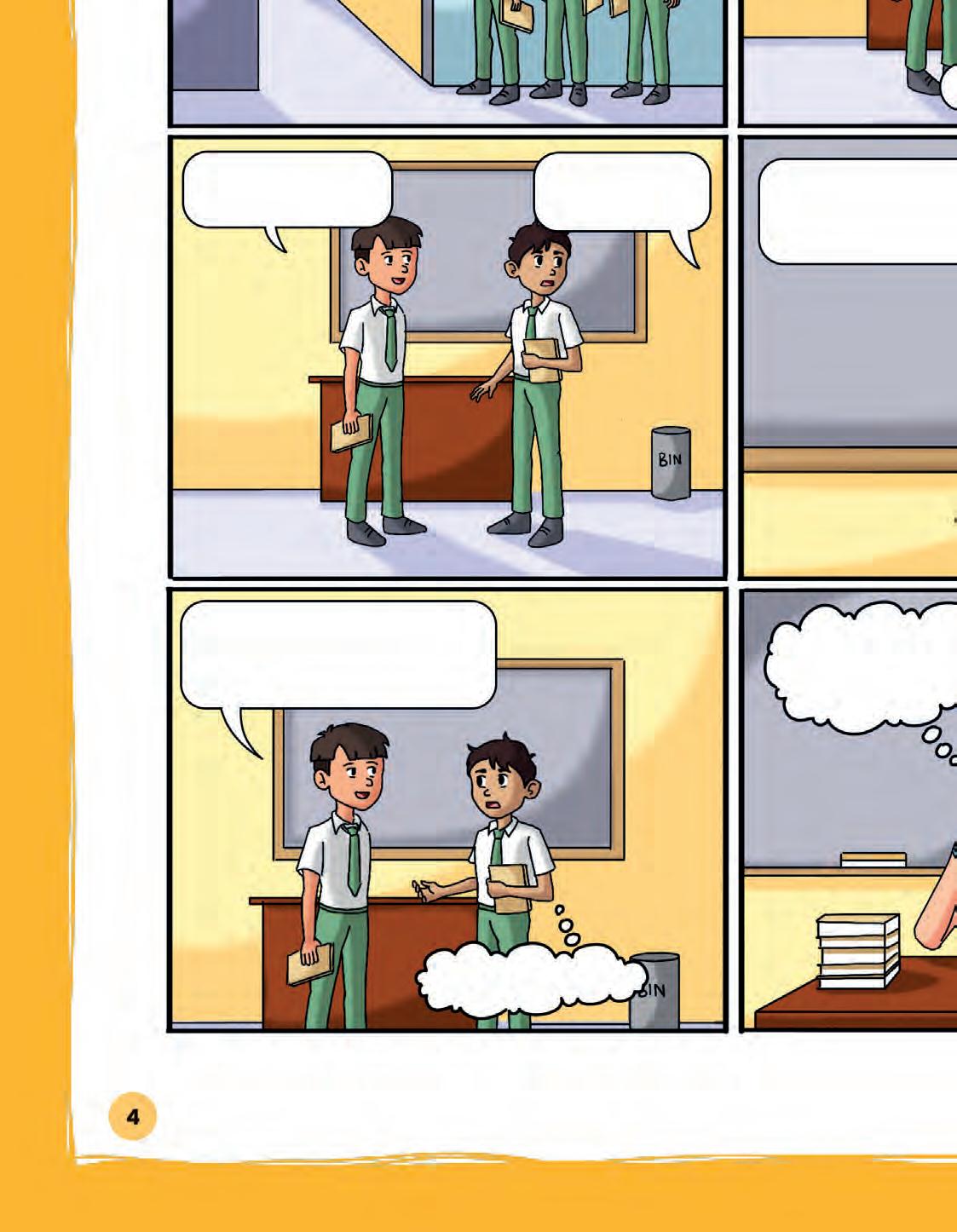

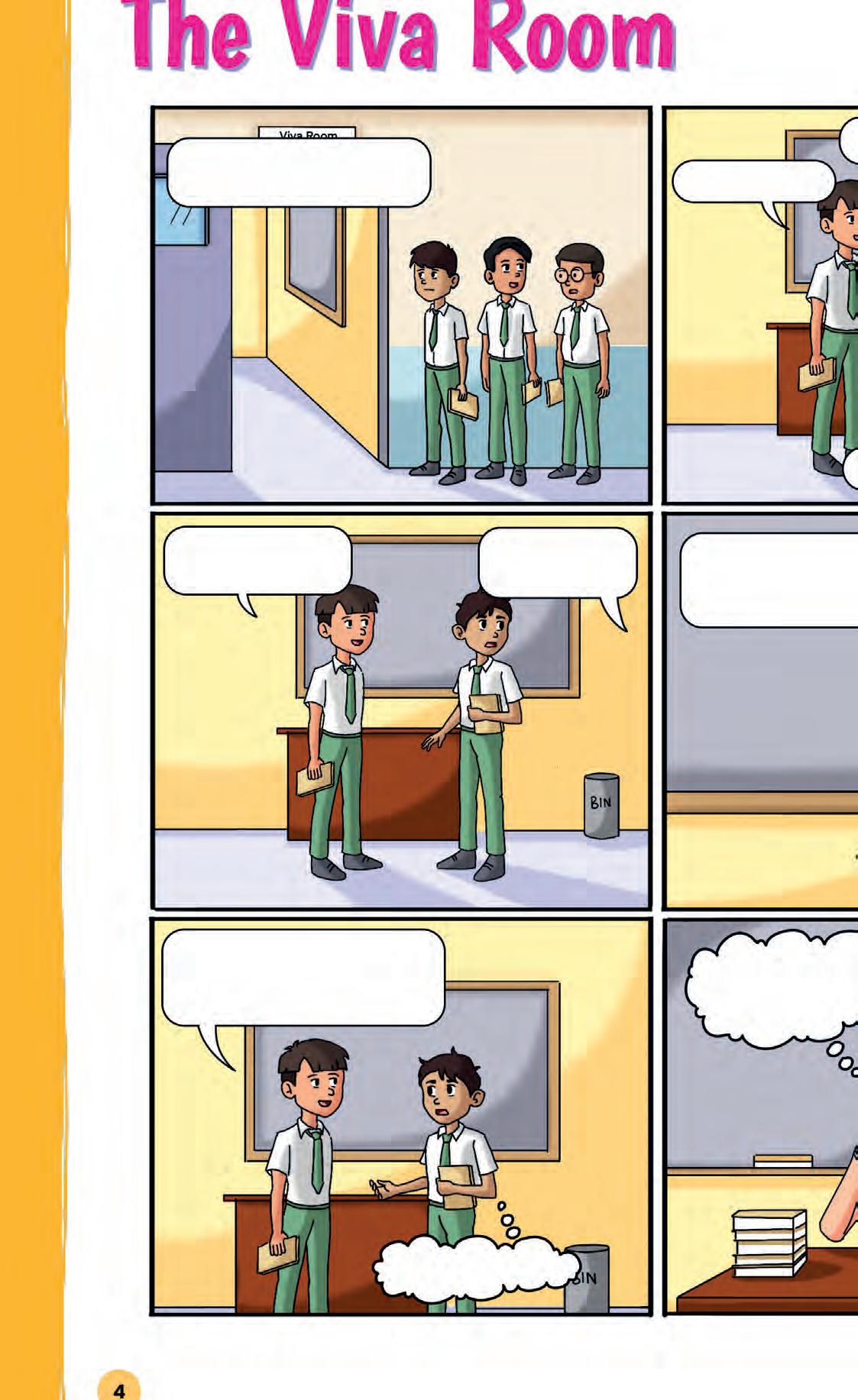

Let me tell you from the beginning.
First…

Then…
Finally…





Nikhil is keen to join Karate classes at his school. He is asking his friend Kenny whether he likes it. Listen to Kenny’s response and record it.
Sanjay needs some help on how he can decorate his new house. What will you advise him? Tell Sanjay.
1. What was the good you ? l a s
2. If you could be a , what would you have?


Get into pairs.
1. Which class exam will you always remember?
Student 1:

Student 2:
2. Do you remember the first competition you participated in?

3. Which co-curricular activity do you enjoy the most?

4. What is your favourite trip memory?
5. Which superpower would you love to have and why?
Write: Discuss with your partner and complete the conversation.
Both: Hello friends, we are going to present a conversation on topic . (mention the topic number )

Student 1: Could you tell me ?
(ask the question – same as the topic)
Student 2: . What about you?
Student 1: .
(share your response to the same question)
Student 2: . (extend the conversation)
Student 1: . (extend the conversation)
Student 2: . (extend the conversation)
Student 1: . (end the conversation)
Practise: At home or in class, practise the conversation with your partner. 4
Present: Present the conversation in the class in front of everyone. 5
Listen carefully to your partner and wait for your turn to speak. Use a lot of actions and expression.


Rate each presentation!
Write your friend’s name
Write your friend’s name
Write your friend’s name

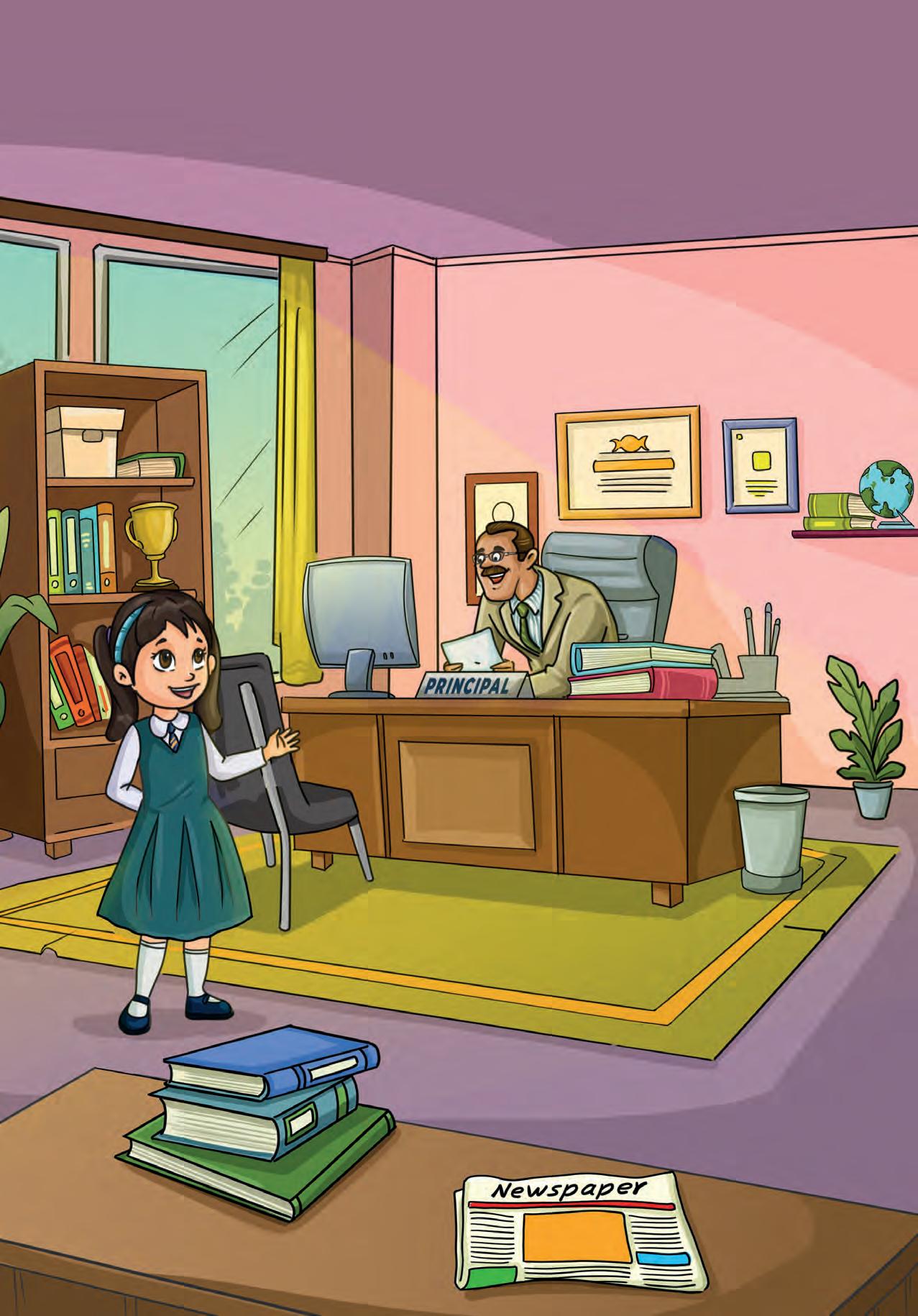



Boost your speaking!


Make a request to your teacher regarding ONE of the situations below. Practise the conversation in class with your teacher.
To clean the playground
not cold
To repair the water cooler
not clean
glasses slippery floor water not fresh
switch not working
Good morning ma’am, I have a request to make.
To take extra classes before exam



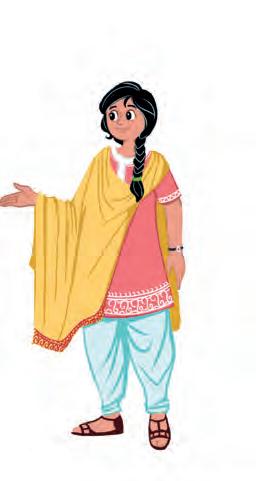



Aditi wants to use a book from the library. Listen and then record it.
You want to start a Book Club at school. Make a request to your principal to grant you permission. Give reasons why you want to start it.

1. What do you say to request something?
2. What do you say to apologise to someone?

3. What do you say to get someone’s attention?
4. What do you say when you get a gift?
5. What do you say when you meet someone?
6. What do you say when someone says ‘thank you’?

Write: Mention the scene and the roles each one of you want to play. Complete the dialogues. 3
Scene: Student 1: Student 2: Your role : Your role :

Student 1: Hello, Sir/Ma’am, I would like to talk about .
(mention the situation that you chose)
Student 2: Please tell me. How can I help you?
Student 1: I request you to .
(explain the problem and suggest what could be done) .
Student 2: Thank you for bringing this to my notice.
Student 1: Thank you.
4
(tell what you would do) .
5
Student 2: .
Practise: Enact the conversation with your partner. Practise many times with appropriate body language and tone.
Present: Now, it is time to present! Act out your conversation in the classroom.

Speak in a polite tone.
Maintain eye contact with your partner. Stand straight and talk formally.

Rate each presentation!
Write your friend’s name
Write your friend’s name
Write your friend’s name

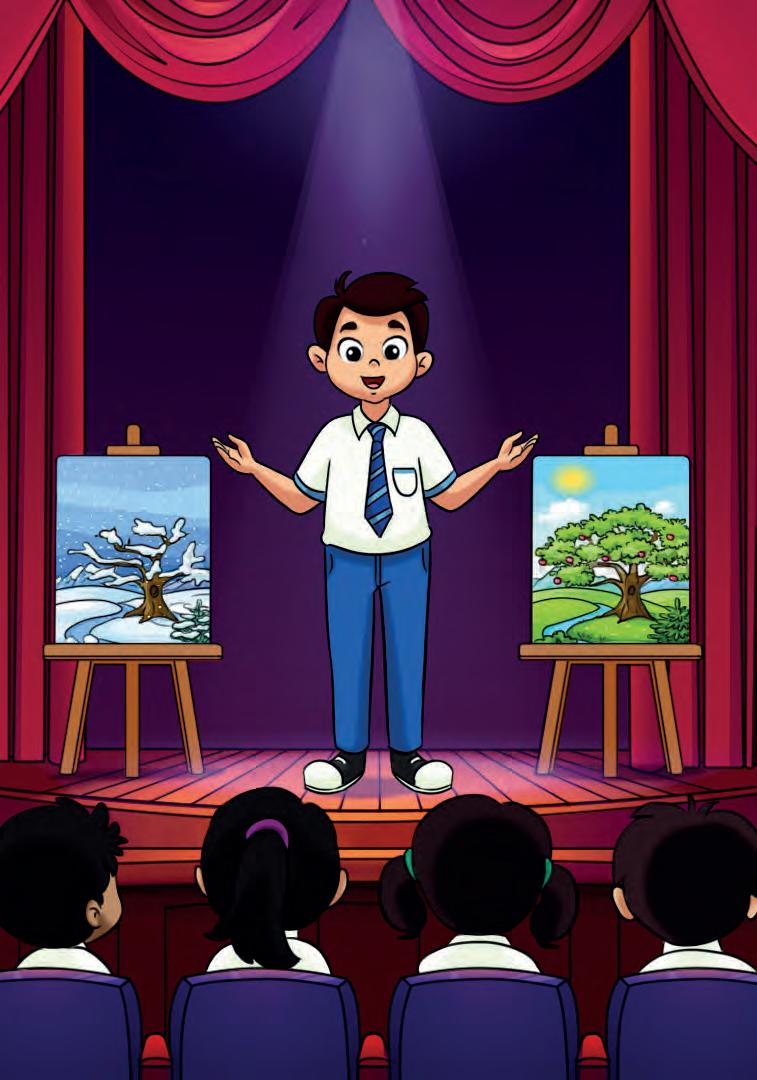

Ostriches are the tallest and heaviest birds in the world!
Ostriches can run superfast. They can run at a speed of over 70 km per hour.

Of all birds’ eggs, ostrich eggs are the largest.

Penguins are excellent divers and swimmers! They can even slide over the ice on their bellies using their flippers.
Emperor penguins rarely go on land. They live on the sea ice (frozen ocean) their entire lives.

Penguins and ostriches are unique and fascinating birds. But just like other birds, penguins and ostriches lay eggs and have feathers, beaks and claws.
Does this mean they can also fly like many birds?
No, penguins and ostriches are both flightless birds. They cannot fly. However, they have other ways of moving from one place to another. Another interesting similarity is that both penguins
and ostriches live in groups. However, their groups vary in size. Ostriches live in small groups called flocks of 10 to 12 birds, whereas penguins live in huge colonies that may have from a thousand to millions of penguins.

Despite many similarities, the birds look very different from each other. All ostriches have long necks, long, strong legs, and bulky bodies covered with feathers. On the other hand, penguins have black bodies and white bellies that help them hide on the ice and in water. There are 18 kinds of penguins in the world, and they differ in size.
Penguins and ostriches also have very different diets. Despite their huge bodies, ostriches feed on plants and some small animals, such as lizards and snakes. On the other hand, penguins feed on fish and other sea animals that are available where they live.
Now, the question is, where do they live?
Most kinds of penguins live in the coldest part of the world – Antarctica. It is the southernmost, ice-covered land near the South Pole. Ostriches, in contrast, are found in the Sahara Desert and the Savanna regions in Africa, which are among the hottest regions of the world.

Thus, ostriches and penguins have some similarities, yet they are unique in their own ways.
bulky (buhl.kee): large and heavy colonies (kaw.luh.neez): a group of creatures of the same type that live together contrast (kon.trast): an easily noticed difference between two or more things differ (dif.er): vary or be different



Boost your speaking!
You learnt so many interesting facts about penguins and ostriches. Share any TWO details about each of them.
Penguin


lives in a colony eats fish
black body
flightless
Antarctica
lays eggs
beaks and claws
swimmer
Ostrich

Sahara Desert
flightless bird
beaks and claws
lives in a flock
70 km per hour
eats lizards and snakes
long neck
largest eggs
tallest and heaviest
Do you remember the story of the fox and the grapes? Listen to the summary of the story and record it.
We want to know about your favourite story. Sum up the story in 4–5 sentences and record it.







Practise: Present your summary in front of your family and friends. Ask what they think!

Present: Now, it’s time to share your summary in class.
Speak slowly and clearly. Ask your friends what they liked about the summary and what could be improved.


Rate each presentation!


Everybody started their day very early in the small village of Bakasagunj. One man, however, started even earlier than the rest — Milkman Raju! At 5 a.m., he would already be out on his bicycle, delivering milk to everyone in the village.
It was usually so quiet at that time that Raju often felt as if he was the only man alive. But that morning, something was different.
As Raju was riding by the pond, something unusual caught his eye. “What is that thing floating in the pond?” Raju stopped his bicycle, got off it, and walked to the edge of the pond.
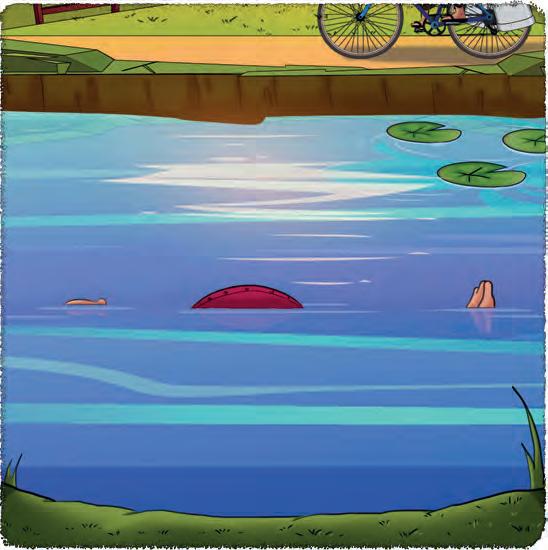
That’s when Raju saw it as clearly as the day — a face, a round belly, and the tips of the toes sticking out above the surface of the water.
“A b-b-body! That’s a body! Help! Help!” Raju screamed at the top of his lungs, but no one heard him.

He left his bicycle there and started running at top speed. He only stopped when he saw Vikas, the newspaper hawker. “Vikas! Please come with me! There is a body floating in the pond!”
The two of them ran back to the pond. Vikas let out a shriek when he saw the body.
Both Raju and Vikas started panicking “Should we jump into the water? Should we call the police?”






Look at the three series of picture stories. Choose any ONE of them and make a story based on it. Share your story in the class.
First tell the option you chose.
Then, tell the title for your story.
Share your story. Add some details on your own.
Listen to the short story and then record it.


Tell us a story that you have read or heard in your own words.





Where will your story take place?
Who are the characters?
What is the problem in the story?
How will your story end?

Ending of your story
Enroute Goa
Nidhi was travelling to Goa with her parents. It was her first road trip. She was very excited! As she sat in the car, her father suddenly exclaimed, “Are we on the right road?” “Let’s check the map,” said Nidhi’s mother. “Uh oh! There is no signal on the phone,” said Nidhi. They felt scared.

They kept exploring the route that they had taken. To their surprise, they had reached a beautiful village - so clean and beautiful. The villagers were very kind and guided Nidhi and her family back to the correct route. But first, the villagers gave them a beautiful tour of the local pond, farms and market.
It turned out to be a blessing in disguise.
Practise: Share your story with your friends and family. Improve your story and style of storytelling with their feedback.
Present: It is time to narrate your story! Present your story to the class.

Narrate your story in a loud and clear voice. Use a lot of expressions and actions to generate interest. You could walk around in the class as you tell the story!

Rate each presentation!
Write your friend’s name
Write your friend’s name
Write your friend’s name

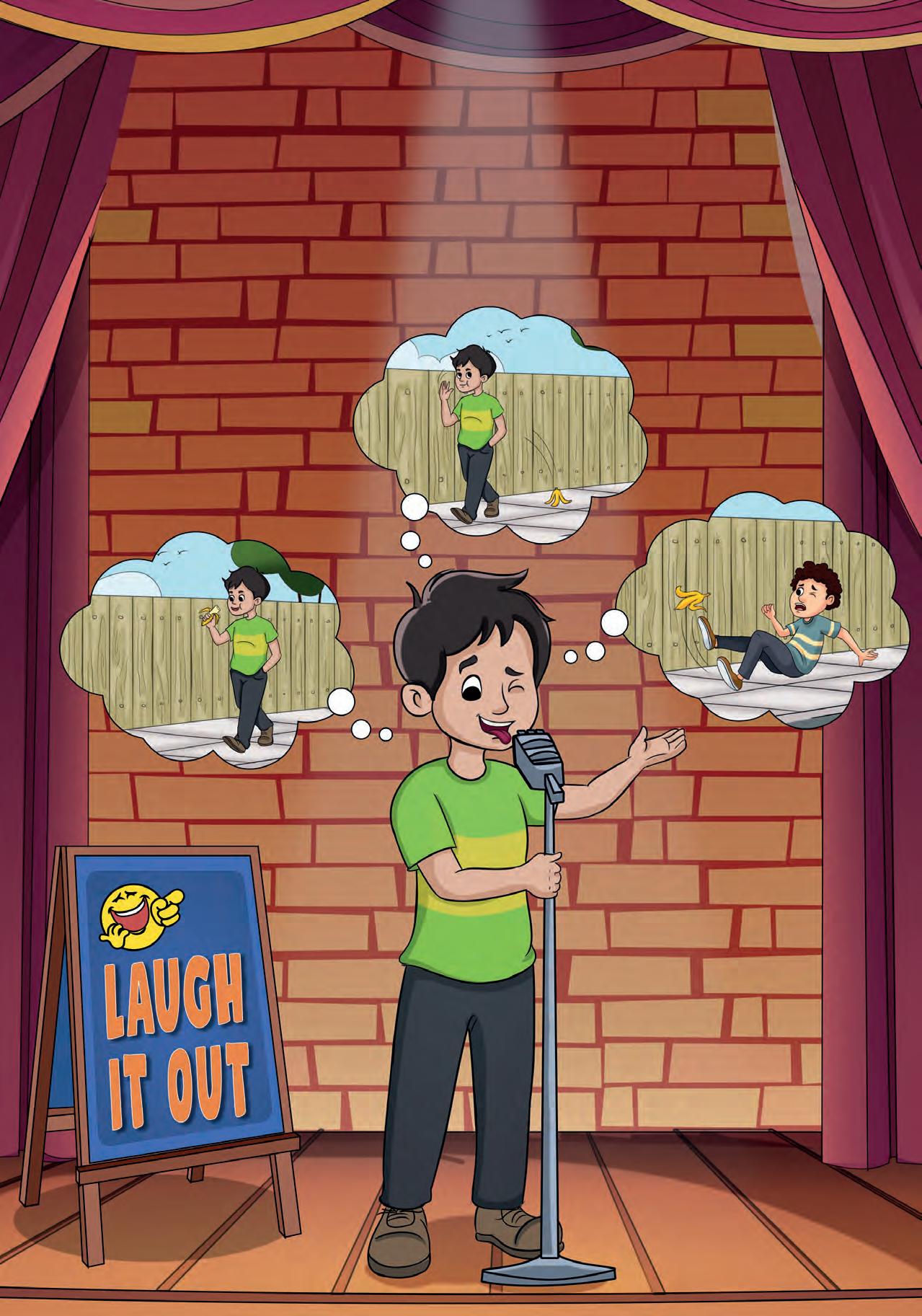




Boost your speaking!

You just read about astronaut, Raunak Singh. Now, imagine you are Raunak Singh. Tell your friends about your experiences in space.
Hello!
It feels great to be back on Earth.
Being in space was quite amazing!
In space...




Pawan, a national-level runner, is sharing how it feels to be back in the game after a break. Listen and record it.
Think about a recent travel experience that you had with your friends or family. Tell us where you went and what you did in 4-5 sentences.






It’s a Social Studies class and the teacher is discussing climate change with students. Sahil raises his hand to ask a question. This leads to a discussion on whether there should be a period for current affairs in schools. Let’s hear everyone’s opinion on it.
Teacher: Climate change has had a terrible effect on the environment. You can see it in the extreme weather events we are experiencing around the world.
Sarah: Yes, like the wildfires in Spain and the US or the floods in Pakistan and Africa.
Teacher: That’s right… Yes, Sahil?
Sahil: Ma’am, I was just wondering how Sarah knows about the floods in Africa.
Sarah: I read it in the newspaper. How do you not know about such an important issue?

Sahil: I’m aware of my own surroundings. I think that’s enough for me.
Sarah: Don’t you feel that we should know what’s happening around the world, Sahil?
Teacher: Both Sahil and Sarah have raised very interesting points. I want to hear what others have to say about
this. How important is it to know about current affairs?
Rohit: I think we should be aware of current affairs. They keep us informed of what’s happening around the world and how it can affect us. It helps us develop our opinions. Moreover, I have a lot to add to our family discussions at the dining table! They are always discussing world events.
Sarah: I think we should have one class in the week in which we talk about current affairs.
Teacher: That’s a great idea! What do you think, Sahil?
Sahil: Hmm… yes… but a lot of the news is so complicated and difficult to read. The only news I understand easily is sports news!
Rohit: I enjoy sports news too! I think we can choose different topics for different classes so that everyone’s areas of interest get covered.
Teacher: That’s a great idea! You can all choose your topics of interest and keep others updated with the latest news.

Sahil: But what’s the point of one whole class just on current affairs? We won’t even have an exam on it.
Teacher: Current affairs will make you more aware of what is happening around the globe. Even if there are no exams, that does not make it any less important.
Sahil: I think you’re right. Maybe we could also have class discussions on some of these relevant topics. They can help us to express opinions confidently.
Teacher: Does everyone agree?
Students: Yes, Ma’am.
Teacher: I’m really impressed with how all of you voiced your opinions and reached a decision. We’ll have one class every week to talk about current affairs!

Boost your speaking!



If you had one extra class every week, which class would you like to take and why? Share your thoughts. Then, ask your friend to share his/her thoughts.
Which class would you like to take? Why?
What do you think?
Feel free to mention any other topic of your own choice. You can share as many reasons as you would like for your choice. Invite another friend to talk about their opinion after you have shared your thoughts.

E-Speak




Listen to Aarav talk about why he likes reading books more than watching movies. Then, record it.
Project
For example: angle change


You can choose any other exercise of your own choice too.










enjoyable relaxing
exercises mind and body great way to connect with nature
energising
full body workout
Speak with clarity, confidence and conviction.
In the end, you may discuss with some of your friends whether they agree with your views or not.




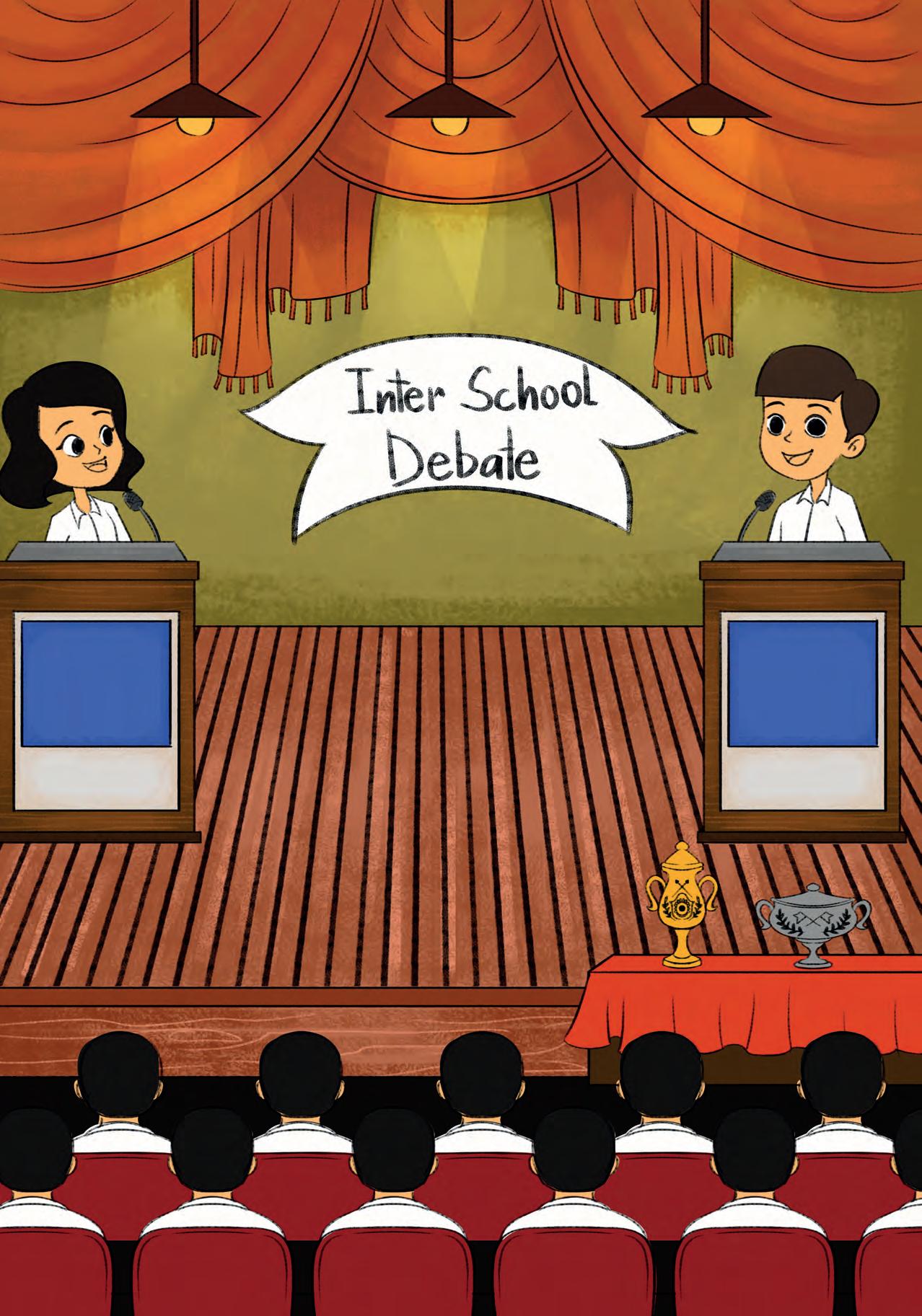

The children of the neighbourhood gathered in the park for their weekly discussion. The topic of the day was, “The use of social media.” Some parents joined in as well.
Rakhi started the conversation. “Parents and friends, today we are going to talk about a topic that is very important to us — Social Media. Is it a boon or a bane? I will defend social media as a boon, while my friend, Brajesh, will put it to you that social media is a bane. You are welcome to share your opinion at the end.”
“Nowadays,” continued Rakhi, “most of us are connected with one another through smartphones and social media. It is difficult to think of life without them. I think that it is a boon because it provides a global platform for us to communicate with others. For example, I have been able to keep in touch with my friend, who moved to another city, all thanks to social media.”
At this point, Brajesh spoke up. “That is true. However, have you noticed how children are glued to their mobile phones all the time? They keep taking photos or recording videos to post online instead of speaking to their friends. We are living in a virtual world, and our interpersonal skills are deteriorating drastically.
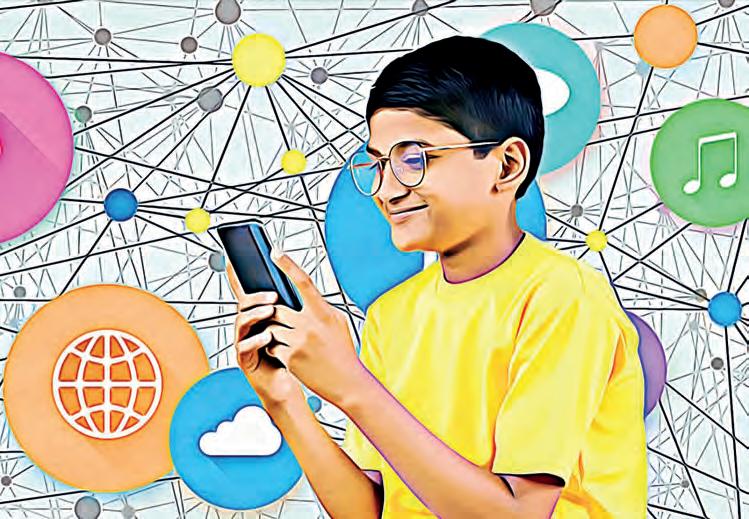
The bane is that if we continue this way, we will soon be unable to communicate face-to-face.”

“That is true, Brajesh, but there are advantages to balance the negative aspects,” responded Rakhi. “Social media allows us to stay connected with friends. During the COVID-19 pandemic lockdown, social media helped me and my family maintain our social life by providing a platform to connect with friends and relatives. Even now, it is simpler to work on group projects because my group members and I can connect online and share materials.”
“I understand that when you cannot meet others due to certain situations, you choose to connect online, but do you feel it is healthy to make it a habit?” asked Brajesh. “I personally think that it is impossible to really get to know people online. When we follow people on social media, we can learn about them from only what they post or share. We may not know what they are like in real life or what is really happening in their lives. Moreover, trolling and cyberbullying on social media platforms can cause profound harm and distress and have been known to negatively affect the self-esteem of individuals.”
There was silence for a few minutes, and then Atul got up. “I think both of you have made some excellent points. In my opinion, the solution lies in a balanced approach. Technology, including smartphones, is here to stay. How we use our smartphones and social media is important.”
“I completely agree with Atul,” said Neena. “Both of you have pointed out that there are advantages and disadvantages of using smartphones and social media. To be honest, every user should be aware of both aspects. I have to admit that communicating personal information online can be dangerous. I can safely conclude that being able to use social media to maintain contact with friends and family is a boon, but reaching out to people you know nothing about has its share of problems, and this makes the usage a bane.”
Everyone agreed to the opinions shared, and the weekly discussion ended with a round of applause.
deteriorating (dih·teer ee·uh·reyt.ing): to become worse distress (dih·stres): a feeling of deep worry or pain interpersonal (in·ter·pur·suh·nl): communication between two people trolling (trohl·ing): posting bad comments online about others


Boost your speaking!
Ansh and Ritika are having a conversation about whether social media is good or bad. Whom do you agree with? Give your own reasons.
I think social media is really useful. I am always up to date with what my friends are doing because of it.





I don’t agree. I think that we end up sharing a lot of information with strangers on social media.
But we can also keep connected with people who are not living close to us. During the pandemic, I kept in touch with my relatives through social media.
That’s right. However, I feel that due to the presence of social media, people are interacting even less in person. They are more comfortable chatting online than interacting face to face.
I agree with... because...




Practise at home!
Listen to what Pawan and Shruti have to say about running as a form of exercise. Then, record it.
Restaurants should stop delivering food in plastic containers. Do you agree or disagree? Tell us in 2–3 sentences.
Rearrange the letters to get the correct word related to social media. One has been done for you.


Choose a topic of your choice and share whether you agree or disagree with it. Finally, present your opinion in class.
1Tick () the topic of your choice. Choose whether you agree or disagree with it.



Statement 1
Students don’t learn much through field trips.


• unsafe
• costly
• wastes time
Statement 2
Cars should be banned in the city.
Agree
• pollution
• traffic
• explore public transport
Statement 3
Playing video games is NOT good for one’s health.
• eyesight problems
• poor health
• violent
• introduce new things
• imagination
• new experiences
• longer travel time
• long distances
• inconvenient
• safe at home
• multiple options
• no injuries
2
Write: Note down your opinion on the topic.




Hello everyone!
Today I have chosen the topic .
(write the topic you have chosen)
(write if you agree/disagree)
(write your reasons)
I would like to . I think so because .
Thank you.
Practise: Express your opinion in front of your family and friends. 3


Present: Now, it’s time to share your opinion in class. 4
Listen to others’ opinions and wait for your turn. Ask questions if you want to. Express your opinion with appropriate expression and body language. Use a polite language to express your opinion.

Rate each presentation!
Write your friend’s name
Write your friend’s name
Write your friend’s name
I will continue...
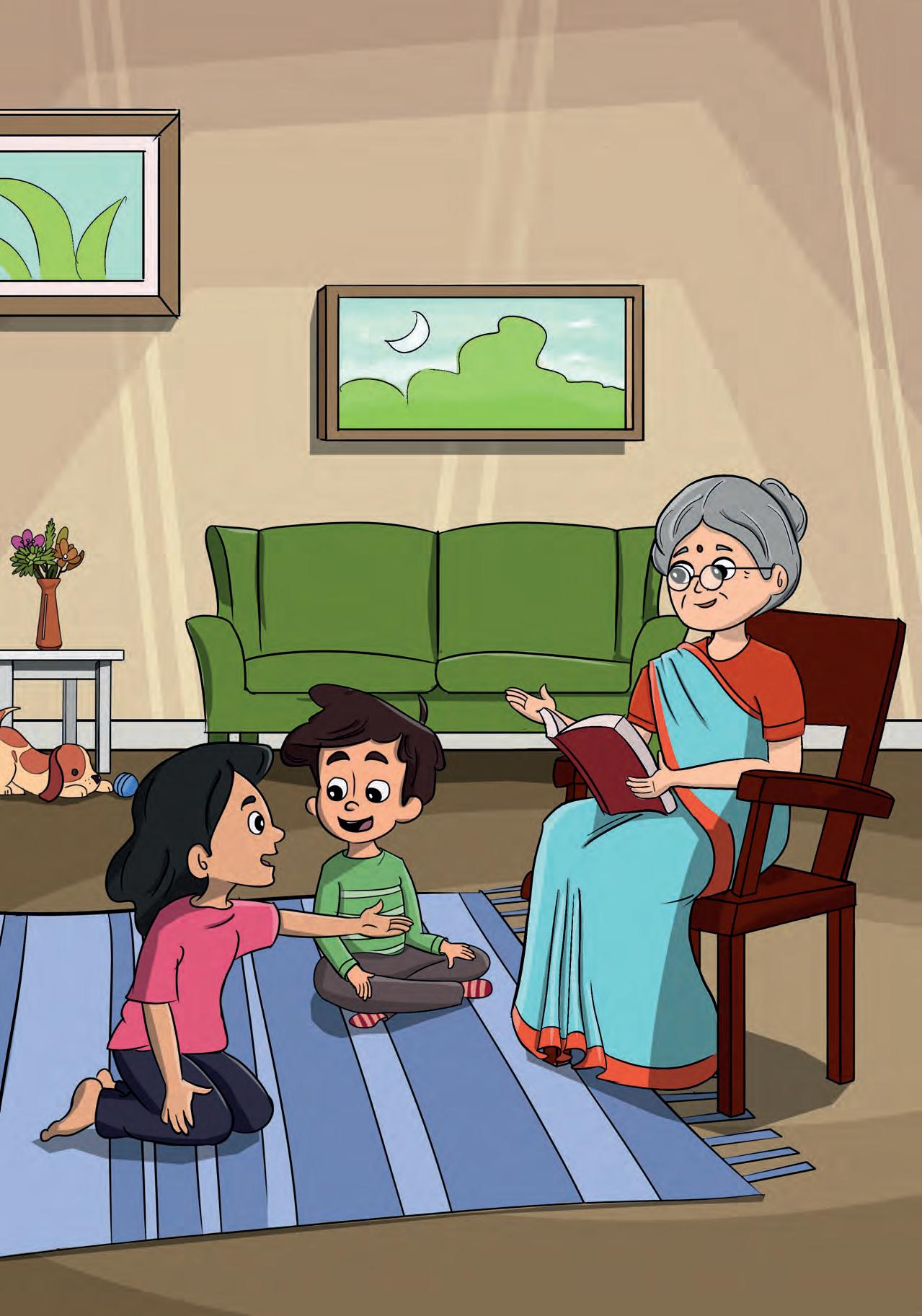
“I have a storytelling competition tomorrow. I can’t wait to participate,” exclaimed Rohit.

Everybody knew that Rohit was a great storyteller. He had won many competitions. This year the theme was science.
That night, Rohit grabbed his science book, Beyond the Earth, for his bedtime read. “Wow, look at these photos!” said Rohit.
After a while, he heard a faint voice.
“Pssst, pssst! Rohit! Come outside. Look what I found. There’s a spacecraft in my backyard.”
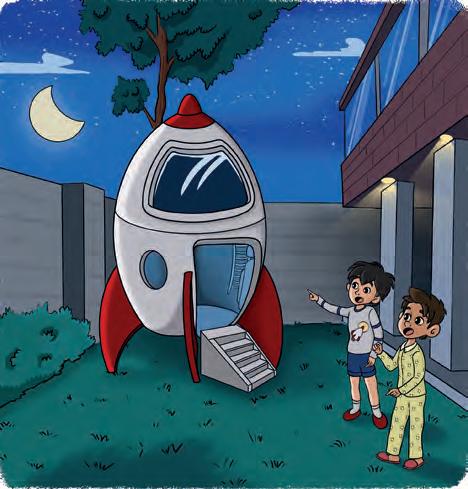
“Isn’t that my friend Montu? What is he talking about? A spacecraft?” wondered Rohit. The two of them ran to Montu’s backyard. When they got to the spacecraft, the doors opened automatically.
“Oh! It seems as if there is nobody inside. Let’s go and take it for a ride!” They were both very excited.
“Montu, look at that planet! It looks so interesting. But why is it all pink?” asked Rohit.
When they landed on the pink planet, they realised that the entire planet was made of candy floss. The trees were made of chocolates, and the ponds were filled with jelly.
Rohit felt thirsty and took out his water bottle, but he accidentally spilt some water on the ground.
“Oh no, the land is dissolving because of the water. Let’s get out of here!” said Rohit with a worried look on his face. Next, they went to a planet where things seemed normal. But when they stepped out of the spacecraft, they realised that everything was in super slow motion. The cars were moving at the speed of humans, and the humans were walking at the speed of turtles.
“Whaaaaat is happeeninggg? Weeee shouuuld leeeaave befoooore thheee dayyyy endsss,” Rohit struggled to speak.
With a lot of difficulty, Rohit and Montu drove their spacecraft off that planet.
“Phew! That was close. Hey, where should we go next?” asked Montu.
“Should we go to THAT planet, the one that looks like a face?” asked Rohit excitedly.
“Let’s go!”
“Oh no, wait. That face looks familiar,” said Rohit in a confused tone. As they approached the planet, Rohit shrieked! “Oh my goodness! Is that my mom? What is she doing here?”
Just then, the mom face-shaped planet started talking.
“Rohit, wake up! It’s 8 o’clock. You will be late for school!”
Rohit opened his eyes and realised that he had been dreaming all along.
He banged the book on his head and complained, “Mom, you ruined the ending of my story! Now I have to think of some other ending. Maybe I should go to sleep again to continue my dream.”
Note to the readers: Can you imagine a different ending to this story that would help Rohit win the competition?
exclaimed (ik·sklaymd): shouted suddenly with strong emotions faint (faynt): a voice that cannot be heard clearly shrieked (shreekt): screamed in a very high voice struggled (struh·gld): made a lot of forceful effort



Boost your speaking!



How would you like to extend this story? Share your thoughts in 3-4 sentences. See below for hints.
Rohit gets late for school.
Rohit gets curious to know more about outer space and planets.



Begin with "In my version of the story..." You can think of another ending if you like.
Rohit sleeps again in the class.
Rohit continues the same dream next night.
Rohit's dream becomes reality!





Listen to Meena talk about the last movie she watched. Then, record it.
‘There was a loud bang at the door… Naina got up scared… She slowly moved to the door. Suddenly,…’
Complete the story in your own way! Tell the story using adequate expressions.


Find these FIVE hidden objects in the picture. One has been done for you.
FIND THESE HIDDEN OBJECTS





Read the incomplete story and add sentences to complete it. Practise narrating the story at home. Finally, narrate the story in class.



Last Sunday, my parents suggested to go for a picnic. We packed our bag with some snacks and water and set off. Halfway up the hill, I realised that I couldn’t find my brother anywhere. Just a few minutes before, he had been running around, but now he was nowhere to be seen!…
Narrate the story with expressions, voice modulation and body language.

You could use some props for narrating the story.

Rate each presentation! Write your


The 'Conversations' book follows a unique spiralling approach that systematically builds language skills and enables children to express themselves verbally in real-world situations, thus preparing them for the needs of the 21st century world. Each chapter focuses on building specific and age-appropriate English language competencies by weaving together activities that are contextual, experiential, joyful, and research-based.
• Activity-based Learning: The book offers joyful and experiential activities that build English communication competencies.
• Texts as per NEP 2020 themes: The book has exciting and stimulating texts that pave the way for English communication activities.
• Tech Integration: The book works in sync with the digital world, where various other activities and projects are undertaken. Learner outputs are evaluated through an AI-based speech recognition engine.
• Assessment of Speaking & Listening as per CEFR: The program includes special assessment that allows systematic reporting on growth of English language skills as per the CEFR.

• Teachers’ Manual: The book is complemented by the Teachers’ Manual that enables teachers to conduct each session effectively.
Uolo partners with K-12 schools to provide technology-based learning programs. We believe pedagogy and technology must come together to deliver scalable learning experiences that generate measurable outcomes. Uolo is trusted by over 8,000 schools with more than 3 million learners across India, South East Asia, and the Middle East.